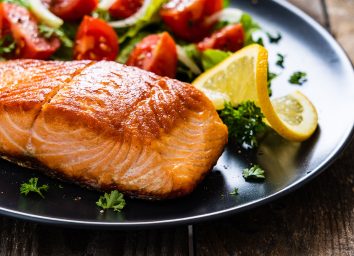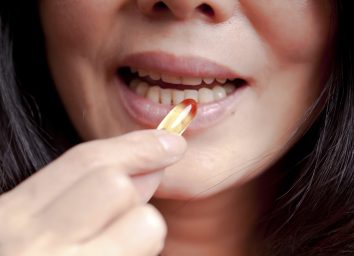One Major Effect of Eating Tilapia, Says Dietitian

Salmon has been enjoying the spotlight for quite some time, but tilapia is the fish you might want to start paying attention to if you haven’t been already. In fact, a large portion of America has probably tried tilapia at one point—it’s actually the most popular farmed fish in America. But despite its popularity, tilapia comes with some controversy due to unsustainable farming practices in certain countries, like China; however, there are many sources of sustainably raised tilapia, and if you can get your hands on tilapia from those farms, it’s in your best interest to do so.
Not only is tilapia inexpensive and versatile—you can eat it plain, blackened, or in some delicious fish tacos—but it is also packed with tons of health benefits.
And one major effect of eating tilapia is that you’ll get a heavy dose of protein!
“Tilapia is a high-quality source of protein and contains all of the essential amino acids that our bodies need to make proteins in our bodies,” says registered dietitian nutritionist Lauren Manaker, MS, RDN, LDN, CLEC, CPT, member of our Eat This, Not That! Medical Expert Board, “and along with the sizable amount of protein that tilapia provides, it comes in a low-calorie and low-fat package, making it a great option for people who are trying to manage their weight in a healthy way.”
Continue reading to learn more about the benefits of getting protein from tilapia, and for more healthy eating tips make sure to check out The 7 Healthiest Foods to Eat Right Now.
Tilapia is loaded with protein
There are about 26 grams of protein in a 100-gram piece of tilapia, which is quite impressive!
For reference, in 100 grams of chicken, you’ll consume about 31 grams of protein, 19 grams of protein in 100 grams of salmon, and about 22 grams of protein in 100 grams of beef!
How much protein do you need?
The amount of protein that you need per day depends on many factors, such as age, gender, and health goals. Many people change around their daily protein levels based on their current diet or fitness routine, but this should be determined with the help of a professional.
For the basic requirements, the FDA suggests a daily value of at least 50 grams of protein based on a 2,000 calorie diet. Again, this number can change based on your own needs, but you can use this as a starting point.
The benefit of getting protein from fish
Many people hear “protein” and automatically assume they should eat more meat. But even though meats like chicken, beef, and pork are high in protein, it can be beneficial to get protein from other foods as well, especially because eating too much red or processed meat has been linked to an increase in cardiovascular disease.
The USDA Dietary Guidelines For Americans 2020-2025 recommends balancing out your meat proteins with foods like eggs, nuts, beans, leafy greens, soy products, and fish.
Not only can eating more fish like tilapia help you avoid eating too much meat, but you’ll get a boost of omega-3 fatty acids which have been linked to better brain function and overall better health.
For more healthy eating news, make sure to sign up for our newsletter!
Read these next:








